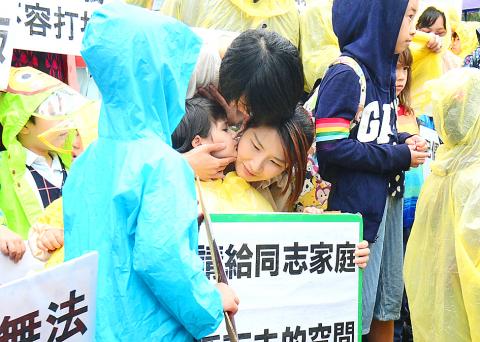More than 1,000 LGBT rights advocates and opponents yesterday demonstrated outside the Legislative Yuan in Taipei ahead of a cross-caucus negotiation on bills related to same-sex marriage.
At today’s cross-caucus negotiation, legislators are to discuss three bills that would, respectively, legalize same-sex marriage, same-sex unions or a same-sex family member registration system.
While the first bill, proposed by the Executive Yuan, would apply most of the marriage rights stated in the Civil Code to same-sex couples, the other two, which are based on suggestions from conservative groups and are respectively proposed by Democratic Progressive Party (DPP) Legislator Lin Tai-hua (林岱樺) and Chinese Nationalist Party (KMT) Legislator Lai Shyh-bao (賴士葆), would offer fewer rights to same-sex couples.

Photo: Wang Yi-sung, Taipei Times
To back the Executive Yuan’s bill, more than 40 same-sex couples yesterday rallied in front of the Legislative Yuan, some bringing their children.
“The Executive Yuan’s version has made some compromises, but it would still help protect families such as mine by allowing people to adopt the biological child of their same-sex spouse,” said Jay Lin (林志杰), who is raising twin sons with his partner.
The other two bills would at best give same-sex parents temporary guardianship over their non-biological children, he said.

Photo: Wang Yi-sung, Taipei Times
If those two bills were passed, “our family would be treated as a second-rate family,” he said.
Cindy, who with her partner of nine years is raising two children she conceived through artificial fertilization, said that her family is the same as every other.
“We love our children deeply. They are not missing anything in their life except for legal protection,” she said.
Should the Executive Yuan bill fail to pass, their children would not have a legal parent if she passed away, she said.
Meanwhile, more than 1,000 protesters led by the Happiness of the Next Generation Alliance rallied on a neighboring street to oppose the bill.
More than 7 million people last year voted in favor of keeping the definition of marriage as a union between a man and a woman, said alliance president Tseng Hsien-ying (曾獻瑩), who initiated the referendum.
“The referendum result cannot be changed by any legislator or even the president,” he said.
If the definition of marriage is altered, families, education and culture would face fundamental changes, he added.
The DPP has advocated for increased public participation in national policies through referendums, but now “only President Tsai Ing-wen (蔡英文) and the Council of Grand Justices are allowed to call the shots,” said Lai, who briefly joined the rally.
“There are only about a dozen grand justices, but we have more than 7 million people,” he added.
The Council of Grand Justices on May 24, 2017, declared the lack of language guaranteeing the right of same-sex couples to get married in the Civil Code unconstitutional, and required that a law or amendment be introduced to legalize same-sex marriage within two years.
The interpretation says that the legislature must pass a law or amendment to legalize same-sex marriage within two years, or it would be automatically legalized.

CHAOS: Iranians took to the streets playing celebratory music after reports of Khamenei’s death on Saturday, while mourners also gathered in Tehran yesterday Iranian Supreme Leader Ayatollah Ali Khamenei was killed in a major attack on Iran launched by Israel and the US, throwing the future of the Islamic republic into doubt and raising the risk of regional instability. Iranian state television and the state-run IRNA news agency announced the 86-year-old’s death early yesterday. US President Donald Trump said it gave Iranians their “greatest chance” to “take back” their country. The announcements came after a joint US and Israeli aerial bombardment that targeted Iranian military and governmental sites. Trump said the “heavy and pinpoint bombing” would continue through the week or as long

TRUST: The KMT said it respected the US’ timing and considerations, and hoped it would continue to honor its commitments to helping Taiwan bolster its defenses and deterrence US President Donald Trump is delaying a multibillion-dollar arms sale to Taiwan to ensure his visit to Beijing is successful, a New York Times report said. The weapons sales package has stalled in the US Department of State, the report said, citing US officials it did not identify. The White House has told agencies not to push forward ahead of Trump’s meeting with Chinese President Xi Jinping (習近平), it said. The two last month held a phone call to discuss trade and geopolitical flashpoints ahead of the summit. Xi raised the Taiwan issue and urged the US to handle arms sales to

BIG SPENDERS: Foreign investors bought the most Taiwan equities since 2005, signaling confidence that an AI boom would continue to benefit chipmakers Taiwan Semiconductor Manufacturing Co’s (TSMC, 台積電) market capitalization swelled to US$2 trillion for the first time following a 4.25 percent rally in its American depositary receipts (ADR) overnight, putting the world’s biggest contract chipmaker sixth on the list of the world’s biggest companies by market capitalization, just behind Amazon.com Inc. The site CompaniesMarketcap.com ranked TSMC ahead of Saudi Aramco and Meta Platforms Inc. The Taiwanese company’s ADRs on Tuesday surged to US$385.75 on the New York Stock Exchange, as strong demand for artificial intelligence (AI) applications led to chip supply constraints and boost revenue growth to record-breaking levels. Each TSMC ADR represents

State-run CPC Corp, Taiwan (CPC, 台灣中油) yesterday said that it had confirmed on Saturday night with its liquefied natural gas (LNG) and crude oil suppliers that shipments are proceeding as scheduled and that domestic supplies remain unaffected. The CPC yesterday announced the gasoline and diesel prices will rise by NT$0.2 and NT$0.4 per liter, respectively, starting Monday, citing Middle East tensions and blizzards in the eastern United States. CPC also iterated it has been reducing the proportion of crude oil imports from the Middle East and diversifying its supply sources in the past few years in response to geopolitical risks, expanding